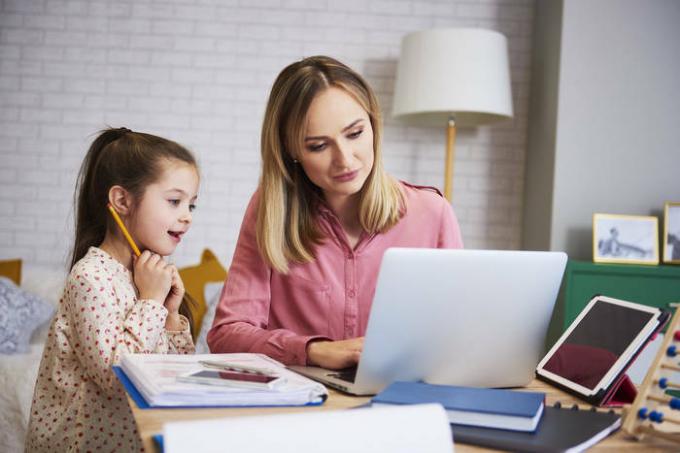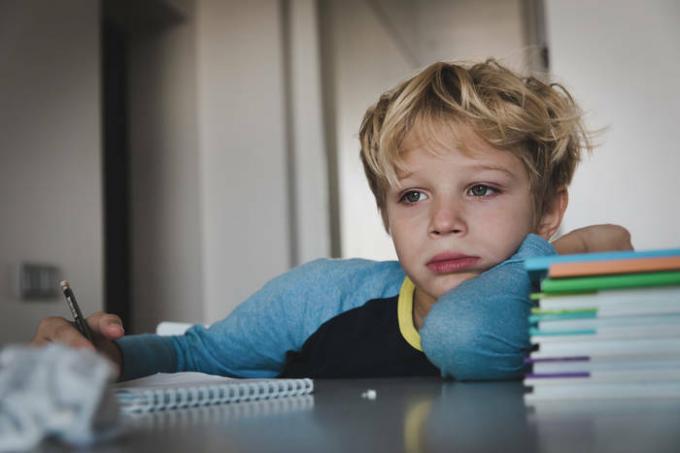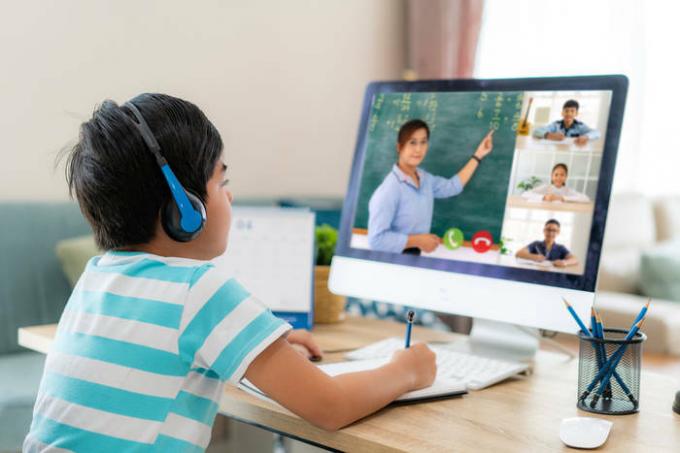Is the teacher obliged to conduct lessons online, how are homework assignments given correctly, whether parents will be punished for the student's “absence” from the Internet class and other questions about distance learning
It would seem that after a year of quarantine, distance learning should have already been on some kind of rails. However, the Internet school still raises many questions for parents. Is the teacher obligated to deliver lessons online and how many simultaneous lessons should there be per day? Are children obliged to sit in such lessons, and why do teachers turn off children without a webcam? What if the teacher does not conduct lessons, and the child must master all the material himself? Sometimes real conflicts flare up between teachers and parents, the children of which, unfortunately, become hostages. Meanwhile, there are answers to all these questions, and they are enshrined in law: in the "Regulations on the remote form of obtaining a complete general secondary education", in a letter to the Ministry of Education and Science "On the organization of distance learning", in the Methodological Recommendations of the Ministry of Education and Science on the same topic and in the updated "Sanitary regulations for institutions of general secondary education ".
First and foremost, your school must be ready for distance learning. No excuses about old computers at school or no stable Internet access are accepted. Back in September last year, the Cabinet of Ministers adopted the Regulation on the Organization of Distance Learning. This document clearly states that the school administration must take care of the systemic and technical support of teachers and the educational institution in advance. Up to the point that teachers are required to issue computers if, for some reason, they do not have this technology. Therefore, if you are denied online classes "for technical reasons", feel free to write to the regional department of education. Indeed, according to the law, the school was supposed to solve this problem six months ago.
How online lessons should be conducted

At least one third of the distance classes must be conducted online / istockphoto.com
Each school determines the form and methods of organizing distance learning independently. But there is one important rule: at least 30% of the classes must take place in a synchronous mode. Synchronous mode means that the teacher and students interact in real time, can ask questions, answer them and communicate with each other "live". Simply put, these are online lessons, most often using video conferencing (although audio conferencing is also allowed by law).
This means that a third of all lessons the teacher is obliged to conduct "live". For example, if you have three math lessons per week on a schedule, at least one of them should be online. More is possible (at the discretion of the teacher), but less is not possible. So, if since the beginning of quarantine your child has not had a single lesson in internet, and all the work of the teacher comes down only to dropping tasks into messengers, you have every right to complain to the school management.
It happens that the teacher is already at an age and cannot master the modern methods of “distance learning”. With all due respect to older teachers, this shouldn't be your problem. The management is obliged to train such a teacher, give him an assistant for conducting online lessons or replace him with another teacher during distance learning.

School must educate older teachers in new technologies / istockphoto.com
How Asynchronous Lessons Should Go
Asynchronous lessons are those 70% of the lessons that are given to the student in self-processing. However, they should not look like “pp. 58-64, ex. 145, 146, 148”. The Regulation on the Organization of Distance Learning states that the asynchronous mode of classes should also be provided as much as possible by the teacher. Ideally, for processing the material, the teacher should give the students everything that he himself uses when conducting lessons, - video and audio materials, presentations, access to virtual libraries and educational platforms. It is highly encouraged (although not required) to read the material by the teacher in the format of audio lectures or video presentations.

The teacher must provide asynchronous lessons with the right materials / istockphoto.com
The teacher gives all the necessary files for asynchronous lessons on the eve of classes. The child processes the material at a convenient time for himself. But the control over the implementation of these tasks lies with the parents. For his part, the teacher has the right to demand a report on homework - for example, in the form of photos in the messenger. The teacher can grade and give points for these works. If an electronic journal is used for this, you must have public access to it. If grades are given in a different way, you can inquire about them directly from the teacher or from the class teacher.
How long are the lessons online
This question causes a lot of controversy and disagreement among parents. Someone complains that children spend the whole day in front of the computer. Someone, on the contrary, is dissatisfied that synchronous lessons last very little, and during this time the child does not have time to master the material. In fact, the duration of online lessons is enshrined in the Sanitary Regulations for Schools, updated to the conditions of quarantine. According to this document, the child's continuous sitting at the computer should fit into the following time frames:
- 1st grade - no more than 10 minutes
- Grade 2-4 - no more than 15 minutes
- 5-7 grade - no more than 20 minutes
- Grades 8-9 - no more than 25 minutes
- Grades 10-11 - no more than 30 minutes

The child must sit in front of the monitor for a limited time / istockphoto.com
These requirements, of course, are quite controversial, and little compatible with reality. Any elementary school teacher will agree that 10 minutes of an Internet lesson is spent only on organizing the children in front of the monitor. It is physically impossible to present any material during this time, not to mention communication and minimal verification of knowledge. Therefore, teachers should interrupt longer classes with dynamic physical education minutes, quick exercises and exercises for relaxation of vision.
If there is no opportunity to be in online lessons
Parents do not always have possibility provide the child with the necessary gadgets to go online. This happens, for example, in low-income families. Or if the family has several children, and all of them are of school age. In this case, everyone should be given not only a separate telephone or computer with Internet access, but also a quiet place in the house where the child can listen to the lesson and answer the teacher's questions. In this situation, no one will fine the parents. The law allows a student to be absent from a synchronized lesson for valid reasons. And if parents cannot buy a "training" phone for a kid - this is one of such reasons.
The school is obliged to enter the position of a student and give him the opportunity to take simultaneous lessons in a different way. For example, a teacher can conduct consultations for him by phone, or throw off presentations and videos for self-processing of the material. Children from socially unprotected or large families may even be allowed to go to school - subject to all quarantine regulations. But to disconnect a child from a lesson on the grounds that he does not have a webcam is a gross violation of the child's right not education. Be sure to complain to the school administration, because such actions of the teacher are not supported by any law and are simply illegal.
Is it possible to record online lessons on video

Video recording of online lessons can only be done with the consent of the teacher / istockphoto.com
This question is of interest to many working parents of elementary school students. Now they have to leave the child at home alone or under the supervision of elderly relatives. Not every pensioner can master online conferences, and the child himself also cannot (or wants) to go to synchronous lessons. In this situation, recording the lesson would be an excellent way out of the situation. But here the legislation gives the solution to the question to the teacher.
According to the norms of the Civil Code, audio and video recording of a person can only be carried out with his consent. Gathering information about a person without their permission is considered a violation of the law. From a legal point of view, the recording of the lesson can be read by collecting information about the teacher. Therefore, you should definitely warn the teacher if you plan to record a lesson (for example, at work).
What language should online lessons be in
The language issue in our country, it would seem, has been resolved. All state and especially educational institutions in their work must use only the state language. Nevertheless, some teachers, out of habit, continue to teach subjects in Russian. This violates the Law of Ukraine "On Education", so contact the school administration for help. The leadership should oblige the teacher to teach in the state language. Or replace him if he refuses to do so.
How to transfer to telecom for good

Parents have the right to permanently transfer their child / istockphoto.com
If, during the quarantine period, the parents came to the conclusion that distance learning for a child is much better than traditional schooling, they have every right to switch to “distance learning” for good. In our country, parents can freely choose the form of education for their child. The only thing is, be prepared for the fact that after the end of quarantine you will have to change schools.
Distance learning is a voluntary form of education (such as family education or external studies). But its main difference from other forms is that distance learning provides for direct contact between a student and a teacher (30% of the general program). Therefore, not all schools can provide students with the opportunity to study remotely in their normal operating mode (not in quarantine). If you want to choose just such a study format for your child, you need to ask the Department of Education, which school offers such a format, and write there an application for enrolling a child on a distance learning training.
You will also be interested in reading:
How to help your child not to be distracted by distance learning
How to keep a student's eyesight during distance learning
Signs your child is better off learning remotely




